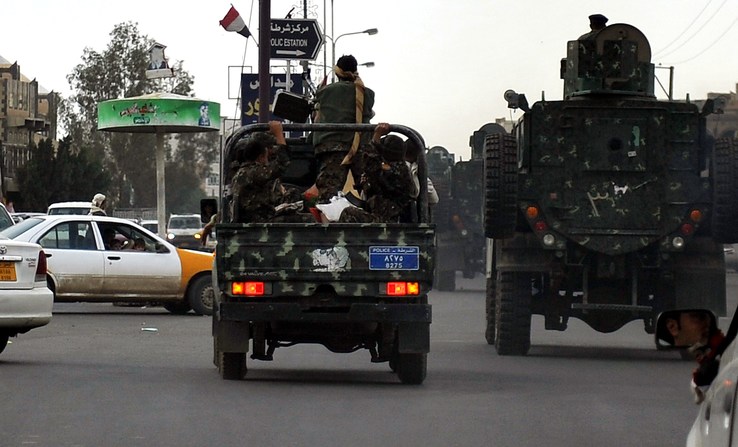CAIRO: Opposition movement Kefaya introduced its newly-elected coordinator Abdel Halim Qandeel in a press conference held on Tuesday.
Qandeel, editor of the independent Sout El-Umma newspaper who was elected in December, described changes within Kefaya including the formation of the Coalition of Egyptians for Change, which the group is currently in the process of organizing.
Qandeel started by tracing the effect of the Gaza war on political movements in Egypt.
He predicted further military confrontations between Israel and Arab resistance groups and said that such confrontations “will not only influence the military arena: their effect also extends to the political domain in the Arab region.
“The Gaza war has led to a clear fault-line between regimes and the people in the region.
“The Gaza war is not something happening abroad. What happens on the military front will influence the political front – there s resistance through arms and resistance through politics, and I think Kefaya s desire to create a coalition falls within the context of the political war which is on the other side of the military war.
“Hamas and Hezbollah and the wave of protests which have spread throughout the region pose a real challenge to the oppressive regimes in this region.
“These regimes are dead … they tried to stop protests against the war which were actually protests against the regimes themselves.
Qandeel is Kefaya s fourth coordinator since the group s creation in 2005. He replaces Abdel Galil Mostafa, the group s transitional leader, who himself replaced Abdel Wahab El-Messeiri, who died last year. George Ishaq was the first coordinator of Kefaya.
“Kefaya has had four leaders within four years. This democratic rotation of power which happens within Kefaya sends a message to society and primarily to other opposition parties, Qandeel said.
“The message is not of course addressed to President Mubarak who has been in power for 28 years and is on another planet altogether.
“It should be remembered that in 2005 the regime had more confidence in itself than it does now as a result of which it allowed protests in downtown Cairo, including the first protests by Kefaya.
“In 2008 the regime was weaker, and has put soldiers on every street and in every square. We must think of new ways of returning to the street.
Kefaya have put in place a plan of action for the transitional period following the end of President Hosni Mubarak’s rule, according to Qandeel.
“The peaceful end to the current regime will be brought about through peaceful civil disobedience carried out by a coalition of the most progressive political and social forces in Egypt, Qandeel explained.
“After the rule of Mubarak and his family comes to a peaceful end, a two-year transitional period will follow during which a neutral leader and a coalition government will rule the country and put in place a rescue plan. A new constitution will also be drawn up.
Referring to statements he made recently to independent daily Al-Dostour, Qandeel said that he was not at liberty to reveal the “surprise which will take place at the end of February.
“I can’t reveal what is planned for the end of February because this is something which must be agreed on by several different parties.
“I can say, however, that it is a fundamental step towards the formation of the Coalition. By the end of February the Coalition will become an established body rather than simply an open invitation.
Kefaya member Karima El-Hefnawy rejected allegations that Kefaya – created in the very specific circumstances surrounding the 2005 protests against inherited rule – no longer has relevance.
“When Kefaya began it knew that in order to stop US and Zionist colonialism, in order to solve the Palestine problem, in order to redistribute wealth which is concentrated in the hands of a minority, we have to change the regime.
“Nothing has changed – the reasons why Kefaya was created still exist. Kefaya and the Coalition of Egyptians for Change will cease to exist when the regime ends.
She argued that Kefaya has led to the creation of new protest movements.
“Kefaya has had an effect since it went into the street of creating new social protest movements. It acts as a bridge between the elite and the real force for change – farmers, workers and students. The Coalition will bring together all these parties in a bigger movement.
Qandeel stressed the importance of Kefaya formulating a manifesto for change.
“During the last four years hundreds of thousands of Egyptians have taken part in political protests. Since December 2006 hundreds of thousands of Egyptians have participated in social protests.
“Kefaya’s role is to bring together this political and social anger. Our demands must include political plurality and the right to housing. Kefaya must now renew its role, and go from a group which calls for change, to a change movement.
“Kefaya started with the slogan ‘no to the inheritance of power’ – it made clear what it didn’t want but didn’t state what it wants. This is the new change in Kefaya.
Recent Gaza protests were marked by the pronounced division between the minority of leftist protestors – who attempted to combine anti-US and anti-Israel slogans with chanting which denounced domestic policy and specifically the ruling regime – and the thousands of Muslim Brotherhood protestors who strictly avoided domestic issues.
Qandeel was asked how Kefaya proposed to deal with this division, and whether it would be prepared to work with the Muslim Brotherhood.
“The Coalition of Egyptians for Change is open for everyone, but on one condition. Groups who wish to join must seek real change rather than simply reform of the existing regime, Qandeel said.
“Reformists would be advised not to join the Coalition – and, even better, check themselves into a mental hospital.
